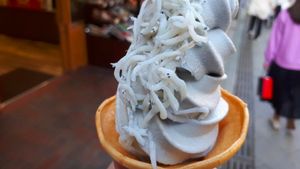JAKARTA The Labubu doll fever that has shocked netizens has recently been in the spotlight. Hundreds of people who are willing to queue since dawn to get this Pop Mart doll are said to be included in the Fear of Missing Out group better known as FOMO.
Since last week, social media has been enlivened by hundreds of people in line at a mall in South Jakarta. Their intention is one, namely to get a Labubu doll. Even according to a number of sources, some of them were willing to queue since dawn, long before the mall's operating hours opened.
Although the appearance of Labubu has actually existed in recent years, this character has gone viral even more after Lisa Blackpink uploaded a photo of her Labubu on Instagram. Since then, the Labubu doll has become very famous in various countries, including Indonesia.
For some people, waiting in line for the Labubu doll for hours, even a riot occurred, was an unnatural thing. Therefore, there is an view that those who are willing to sacrifice for the sake of the Labubu bonela queue are those who are FOMO or afraid to miss the trend.
However, according to clinical and forensic psychologist Kasandra Putranto's view, the queue phenomenon in Labubu can be seen from two sides, depending on the context and motivation of people who queue. If many people queue for fear of missing out on moments or experiences that are considered special, especially if there is an influence from social media, then this is more towards FOMO.
"PHOMOs can cause dissatisfaction and anxiety, as well as affect individual mental health. FOMOs can also encourage consumptive behavior, where one feels the need to participate in various activities or trends just to feel connected or not to be left behind," Kasandra told VOI.
However, he added, if people queue just because they see other people doing it without understanding what they are queuing for, then this can be considered a social challenge.
The term FOMO is quite popular in the past few years. Just, FOMO is a feeling of anxiety and fear in a person because he misses something new, such as news, trends, and so on.
This fear of being left behind refers to the feeling or perception that other people have fun, live a better life, or experience better things.
Kasandra said, one of the causes of FOMO is excessive social media use. A person who experiences FOMO will continue to check his cellphone when he wakes up and can also sleep before going to sleep as if he doesn't want to be left behind by the news. In addition, using social media also often makes a person compare his life with other people who look more enjoyable or happy.
SEE ALSO:
"People who FOMO prioritize social media over real life, as a result, trigger the desire to be recognized by others in the virtual world," explained Kasandra.
He added that FOMO is also marked by constantly wanting to know about other people's activities, as well as spending more than people can afford and shopping for items that are not too important so they are not outdated.
Although it is often associated with anxiety and dissatisfaction, Kasandra denies that FOMO always has negative connotations. Fear of missing something can actually have a positive impact, including the motivation of a person to engage or participate in social activities, which can expand social networks, and create new experiences.
"In addition, FOMO can also make people more sensitive to existing opportunities, so they are more likely to try new things," he explained.
FOMO also turns out to be good for self-development, because with this feeling a person may be encouraged to develop skills or hobbies that have never been tried before.
"However, if FOMO is excessive, it can cause stress, anxiety, and unhealthy social comparisons. Balance is important to maintain a positive social experience," he said.
If left unchecked, excessive FOMO syndrome can have a negative impact. For this reason, Kasandra suggested always focus on yourself and distract from what others do. Social media restrictions are also said to prevent someone from entering the FOMO group.
Reduce the time spent on social media to avoid unhealthy comparisons. In addition, follow activities that are really in demand and that are in accordance with personal values, not just because the trend can prevent a person from becoming a FOMO," he stressed.
Another thing that can be done so as not to feel afraid to'stay behind', said Kasandra, is to always train gratitude, set priorities, be realistic, and establish quality relationships.
"In addition, implementing theJoy of Missing Out or JOMO to deal with FOMO can also be done by implementing the Subjective Well-Being, namely a subjective evaluation of a person about life such as living satisfaction, fun emotions, satisfaction with relationships such as marriage and work," he said.
The English, Chinese, Japanese, Arabic, and French versions are automatically generated by the AI. So there may still be inaccuracies in translating, please always see Indonesian as our main language. (system supported by DigitalSiber.id)













